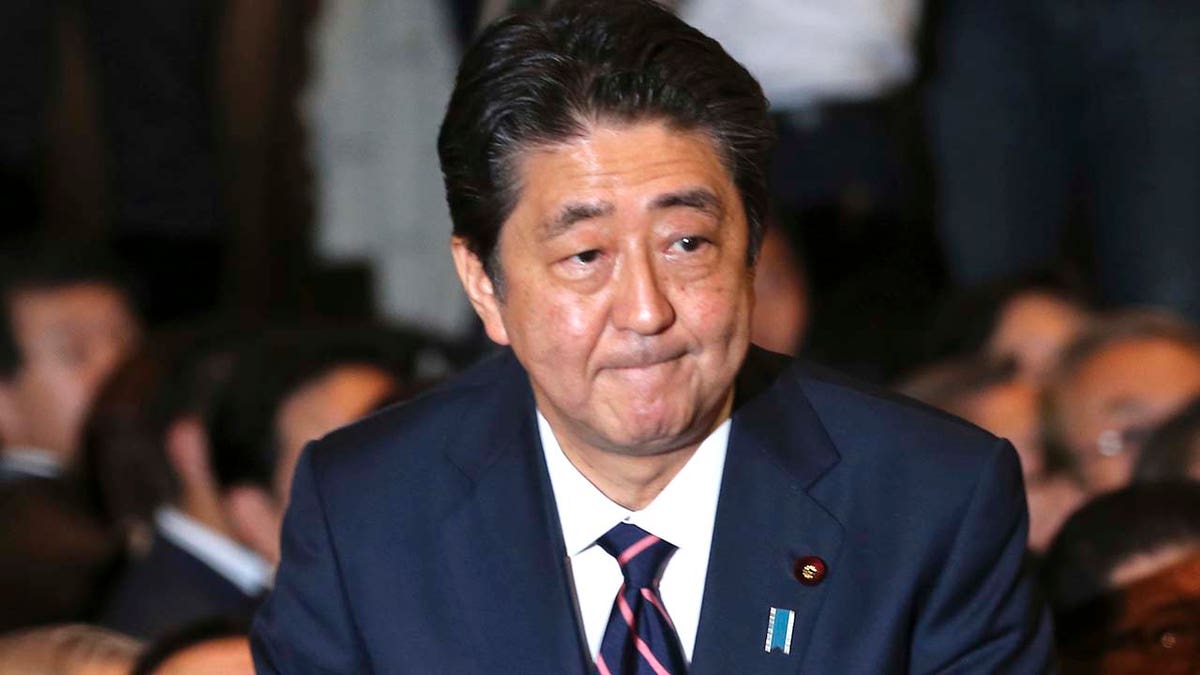
Liberal Democratic Party President Shinzo Abe receives applause from the LDP lawmakers shortly after his name was called as the winner of the ruling party presidential elections at its headquarters in Tokyo, Sept. 20, 2018. (Associated Press)
TOKYO – Japanese Prime Minister Shinzo Abe was re-elected as head of his ruling Liberal Democratic Party in a landslide Thursday, paving the way for up to three more years as the nation's leader.
The decisive victory may embolden Abe to pursue his long-sought revision to Japan's U.S.-drafted pacifist constitution, although the hurdles remain high and doing so would carry political risks.
"It's time to tackle a constitutional revision," Abe said in a victory speech. "Now the fight is over."
Abe said he's determined to use his last term to pursue his policy goals to "sum up" Japan's postwar diplomacy to ensure peace in the country.
"Let's work together to make a new Japan," he said.
Abe, who has been prime minister since December 2012, has cemented control of his party and received support from conservatives for bringing stability and continuity to economic and diplomatic policies. With a third term as party leader, Abe is poised to become Japan's longest-serving leader in August 2021.
With a third term as party leader, Abe is poised to become Japan's longest-serving leader in August 2021.
Still, he faces several challenges, including dealing with Japan's aging and declining population, a royal succession in the spring, and a consumption tax hike to 10 percent he has already delayed twice. He faces security concerns stemming from North Korea's nuclear and missile threats, and China's increasingly assertive activity in the region, as well as intensifying trade friction with the U.S. which could shake his friendly relations with President Donald Trump.
Abe has said he is determined to push for a revision to the U.S.-drafted 1947 constitution, a decades-old pledge of the Liberal Democratic Party since its foundation in 1955 and a goal that none of Abe's predecessors has been able to achieve.
Abe has said he hopes his party could submit a draft constitution revision to a parliamentary session later this year ahead of a national referendum. Abe is proposing to add a clause to Article 9, which bans the use of force in settling international disputes, to explicitly permit the existence of Japan's military, now called the Self-Defense Force.
Many conservatives see the constitution as a humiliation imposed on Japan following its World War II defeat. Among them was Abe's grandfather, Nobusuke Kishi, who served as prime minister 1957-1960. Kishi was imprisoned as a suspected war criminal during the U.S. occupation.
Constitutional revision is divisive and it's unclear whether Abe could get enough votes for passage.
Abe and his senior party members want to rush a revision while their ruling coalition still holds two-thirds super majority in both houses — a requirement to propose a revision. The next parliamentary election is due next summer.
For the public, the constitution is a lesser concern than issues such as pay, education and the high cost of child care, surveys show.
If a revision is voted down in a national referendum, Abe would likely have to step down
Abe has survived a series of scandals, including cronyism allegations against him and his wife. Despite attacks from opposition parties and criticism in the media, he has seen his support ratings bounce back to about 40 percent, considered high for a Japanese leader after nearly six years in office.
An extended term for Abe is generally seen as good news for stability and continuity.
"A stable government under a strong leader is good for the economy and diplomacy, and Prime Minister Abe has established a rather significant presence in diplomacy," said Yu Uchiyama, a University of Tokyo politics professor.
But his long and strong leadership has caused a lack of political competitiveness, Uchiyama said.
"The biggest concern about Japanese politics is how to restore competition in politics and reactivate democracy," Uchiyama said.
In Thursday's leadership vote, Abe handily defeated his sole challenger, Shigeru Ishiba, a former defense minister. Abe won 553, or about 70 percent, of 807 votes.
Abe took 80 percent of parliamentarian votes, while support from regional rank-and-file party members was at 55 percent, though it fell within projections.
Experts see the margin of victory in regional member votes as a more accurate indicator of general public sentiment than the parliamentarian votes. Abe's softer showing there means he will have to be more mindful of voices coming from outside parliament.
Abe's dominance has been bolstered by the strengthening of the Prime Minister's Office, allowing him and his party executives to monopolize decisions over policies and personnel affairs, experts say. The system has accommodated Abe's long reign, as many lawmakers are primarily interested in getting Abe and other senior lawmakers' backing in elections.
Follow Mari Yamaguchi on Twitter at www.twitter.com/mariyamaguchi
